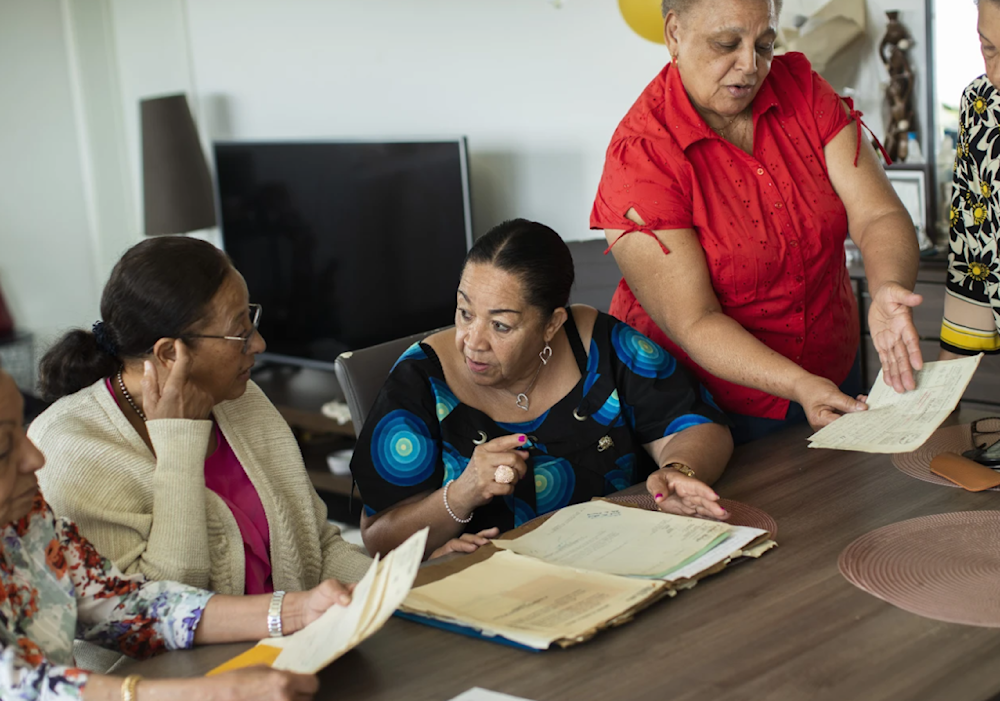Belgium found guilty of crimes against humanity in colonial Congo
Belgium's court of appeals has found the state guilty of crimes against humanity for forcibly separating five mixed-race children from their mothers in colonial Congo, awarding each woman €50,000 in damages
-

Marie-Jose Loshi, Monique Bitu Bingi, Lea Tavares Mujinga, Simone Ngalula, and Noelle Verbeeken speak with each other as they look over papers in Brussels, Belgium on June 29, 2024. (AP)
The Belgian state has been found guilty of crimes against humanity for forcibly separating five mixed-race children from their mothers in colonial Congo.
Belgium's court of appeals ruled Monday that five women, born in the Belgian Congo and now in their 70s, were victims of "systematic kidnapping" by the state when they were removed from their mothers as small children and sent to Catholic institutions due to their mixed-race heritage.
"This is a victory and a historic judgment," Michèle Hirsch, one of the women's lawyers, told local reporters. "It is the first time in Belgium and probably in Europe that a court has condemned the Belgian colonial state for crimes against humanity."
Monique Bitu Bingi, who was separated from her mother at the age of three, told The Guardian that justice had been served and expressed relief that the judges "recognized that this was a crime against humanity."
She was informed of the decision with the four other ladies who brought the lawsuit to their lawyer's office. "We jumped for joy," she explained.
Noëlle Verbeken, who was abducted from her mother and sent 500 km away, told Belgium's francophone public network RTBF that this decision shows "we are recognized."
Léa Tavares Mujinga, Simone Ngalula, Marie-José Loshi, Bitu-Bingi, and Verbeken, all born to Congolese mothers and European fathers, were forcibly taken from their families by the Belgian colonial administration between 1948 and 1953 due to their mixed-race heritage and relocated to a Catholic mission in southern Kasaï.
After losing a case in 2021, the five women appealed, challenging the lower court's ruling that their abduction and segregation were not considered crimes under colonial law.
Treated as 'children of sin'
The court of appeals rejected Belgium's defense, noting its commitment to the Nuremberg tribunal legislation and the concept of crimes against humanity. The court ordered Belgium to pay €50,000 in damages to each of the women for the emotional distress caused by their forced separation from their families and loss of identity.
Thousands of children were affected by Belgium's program of forced removals and segregation in its former colonies, though the exact number remains unclear.
The girls, sent to the Katende mission, were registered as "mulattoes," their fathers' names erased or incorrectly listed, and were given new surnames and forged birth dates. At the mission, they were treated as "children of sin" and two were eventually raped during the civil war.
Four of the women eventually gained Belgian citizenship after lengthy legal battles, while Marie-José Loshi, who never received Belgian nationality, moved to France and became a citizen. The court ruled that their struggles with gaining citizenship and official recognition were not crimes against humanity, offering some relief to the Belgian authorities.
In 2018, Belgian Prime Minister Charles Michel apologized for the mistreatment of mixed-race children, acknowledging a violation of their human rights. The government created a body to help individuals trace their roots and is investigating the full extent of those affected by the policy, though the available records are incomplete.

 3 Min Read
3 Min Read








